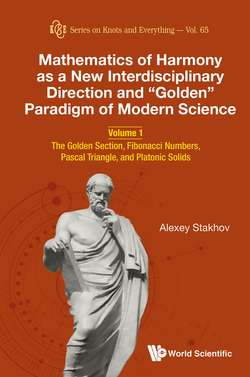Читать книгу Mathematics of Harmony as a New Interdisciplinary Direction and “Golden” Paradigm of Modern Science - Alexey Stakhov - Страница 30
На сайте Литреса книга снята с продажи.
1.3.2. The significance of the Proclus hypothesis for the development of mathematics
ОглавлениеThe main conclusion from the Proclus hypothesis consists in the fact that Euclid’s Elements, the greatest Greek mathematical work, was written by Euclid under the direct influence of the Greek “idea of Harmony”, which was associated with the Platonic solids.
Thus, the Proclus hypothesis makes it possible to suggest that the well-known doctrines in ancient science “Pythagorean doctrine of the numerical harmony of the Universe” and Plato’s cosmology, based on regular polyhedra, were embodied in Euclid’s Elements, the greatest mathematical work of the ancient Greek mathematics. From this point of view, we can consider Euclid’s Elements as the first attempt in creating the Mathematical Theory of the Universal Harmony, which was associated in ancient science with the Platonic solids. This was the main idea of the ancient Greek science! This is the main secret of Euclid’s Elements, which leads to the revision of the history of the origin of mathematics, starting since Euclid.
Unfortunately, the original Proclus hypothesis, concerning the true Euclid’s goals in writing the Elements, was ignored by modern historians of mathematics, which led to a distorted view of the structure of mathematics and the whole mathematical education. This is one of the main “strategic mistakes” in the development of mathematics.
The Proclus hypothesis had a great influence on the development of science and mathematics. In the 17th century, Johannes Kepler, by developing Euclid’s ideas, built the Cosmic Cup, the original model of the Solar system, based on the Platonic solids.
In the 19th century, the eminent mathematician Felix Klein (1849–1925) proposed that the icosahedron, one of the most beautiful Platonic solids, is the main geometric figure of mathematics, which makes it possible to unite all the most important branches of mathematics: geometry, Galois theory, group theory, invariant theory, and differential equations [113]. Klein’s idea did not get further support in the development of mathematics, which can also be considered as another “strategic mistake”.
